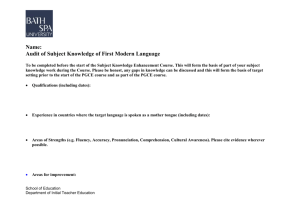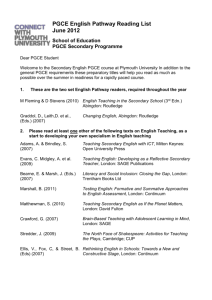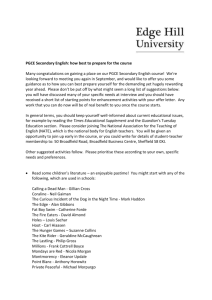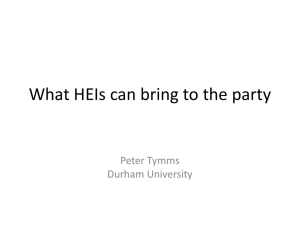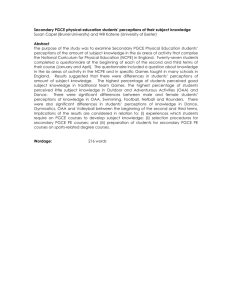Practical Ethics
advertisement
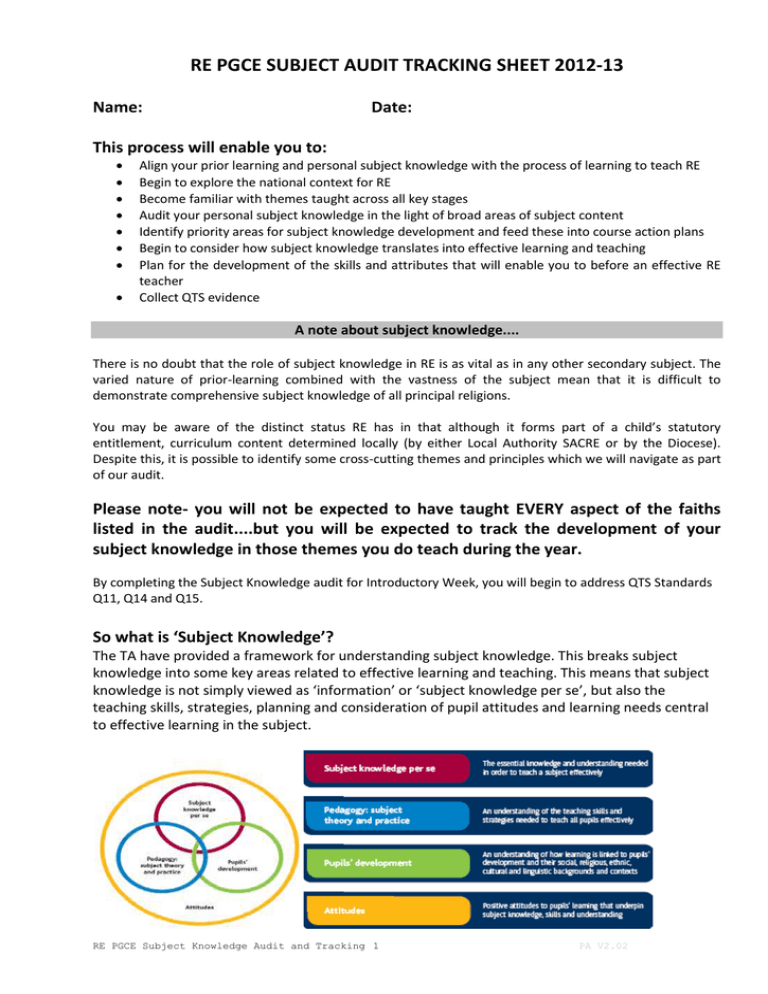
RE PGCE SUBJECT AUDIT TRACKING SHEET 2012-13 Name: Date: This process will enable you to: Align your prior learning and personal subject knowledge with the process of learning to teach RE Begin to explore the national context for RE Become familiar with themes taught across all key stages Audit your personal subject knowledge in the light of broad areas of subject content Identify priority areas for subject knowledge development and feed these into course action plans Begin to consider how subject knowledge translates into effective learning and teaching Plan for the development of the skills and attributes that will enable you to before an effective RE teacher Collect QTS evidence A note about subject knowledge.... There is no doubt that the role of subject knowledge in RE is as vital as in any other secondary subject. The varied nature of prior-learning combined with the vastness of the subject mean that it is difficult to demonstrate comprehensive subject knowledge of all principal religions. You may be aware of the distinct status RE has in that although it forms part of a child’s statutory entitlement, curriculum content determined locally (by either Local Authority SACRE or by the Diocese). Despite this, it is possible to identify some cross-cutting themes and principles which we will navigate as part of our audit. Please note- you will not be expected to have taught EVERY aspect of the faiths listed in the audit....but you will be expected to track the development of your subject knowledge in those themes you do teach during the year. By completing the Subject Knowledge audit for Introductory Week, you will begin to address QTS Standards Q11, Q14 and Q15. So what is ‘Subject Knowledge’? The TA have provided a framework for understanding subject knowledge. This breaks subject knowledge into some key areas related to effective learning and teaching. This means that subject knowledge is not simply viewed as ‘information’ or ‘subject knowledge per se’, but also the teaching skills, strategies, planning and consideration of pupil attitudes and learning needs central to effective learning in the subject. RE PGCE Subject Knowledge Audit and Tracking 1 PA V2.02 Tracking the Development of Your Subject Knowledge The Audit and Tracking Sheet will enable you to record the development of your subject knowledge against a list of themes you may encounter during your PGCE Year. Please maintain this record electronically so that you will have the space to continue to up-date information as the course progresses. Before you start the PGCE Course.... Use the following codes to fill in the ‘personal subject knowledge’ column - you can use this to either reflect on learning undertaken during subject enhancement courses as well as modules studied at degree level: S: Secure level of personal subject knowledge and confidence (‘I would feel comfortable teaching this at A level or to fellow teachers/peers’) M: Moderate level of personal subject knowledge and confidence (‘I would feel comfortable teaching this at KS3 and KS4’) P: This is an area is a priority for development (‘I would need to engage in significant personal study before teaching this theme’) It is not essential to have an encyclopaedic knowledge of all religions! It is more important for you to arrive with an awareness of the areas you could prioritise, combined with a willingness to use active research as a means of boosting those areas. Your placement school, the University Resource Centre and the internet will provide a range of information to support the development of your subject knowledge. Tracking your progress in this area is vital- please up-date this document weekly! How will I use the outcomes of my Audit and Tracking Sheet? Q14 requires that trainees ‘Have a secure knowledge and understanding of their subjects/curriculum areas and related pedagogy to enable them to teach effectively across the age and ability range for which they are trained’. At key points in the PGCE, your Tutor and Subject Mentor will discuss the development of your subject knowledge with you. The information from your audit and tracking will be used to address the following questions: Do you have a secure pedagogical knowledge and understanding of RE and the themes you are engaged in delivering? Can you plan and set subject-related targets for individuals and groups of learners? Can you break down ideas and concepts and sequence them logically to support the development of learners’ knowledge and understanding? Can you answer learners’ questions confidently and fully? Are you aware of and can you respond to learners’ common misconceptions? Are you able to make effective interventions to scaffold learning? Can you analyse learners’ progress and make accurate assessments of their learning and achievement? Your Audit and Tracking Sheet will also be used as a source of reference for your TTT portfolio, Progress Review Tutorials and also as an important source of QTS evidence. Direct cross references may be made with Q10 (Teaching and Learning) Q11, Q12 (Assessment and monitoring) You should make Q15 (Subjects and curriculum) reference to the relevant Q17 (Literacy, Numeracy and ICT) standards touched upon Q19 (Achievement and Diversity) as you complete the Q22 (Planning) Q25a, Q25b, Q25c, Q25d (teaching) tracking process Q26a, Q26b, Q27, Q28 (Assessing, monitoring and giving feedback) Q29 (Reviewing teaching and learning) RE PGCE Subject Knowledge Audit and Tracking 2 throughout the PGCE year PA V2.02 Buddhism Use the columns to indicate where you have touched upon these issues in both ‘Personal Study’ and ‘Pedagogical contexts’. For example, you may have studied the Life of the Buddha as part of a booster course and then delivered a lesson to Year 9 students during your serial visits. Be as specific as possible. Areas Personal Subject Knowledge Rating before PGCE Course (S, M, P) Pedagogical Subject Knowledge and Issues Arising: As you teach each theme, note any challenges, barriers, and common misconceptions encountered. Which key concepts were involved? What worked well? What would you change next time? How did it impact on pupils’ development and attitudes? Note useful links and resources. Review date and Related Standards (e.g. Q10, Q11, Q12 etc..) Beliefs Life of the Buddha Three Universal Truths Four Noble Truths and the Noble Eightfold Path Law of karma, samsara and rebirth Enlightenment and Nivarna Five precepts Fasts and Festivals Uposatha Days Wesak History/Major Divisions Theravada Buddhism Tibetan and Zen Buddhism Western Buddhist Order Places and Forms of Worship Practice of puja in the home Symbolism of rupas Temples, viharas and stupas Buddhist meditation Religion in the Community and Family Living according to Buddhist principles Role of the Sangha and its relationship with the laity Lifestyle of Bhikkhu and Bhikkhuni Funeral rites Beliefs about death, dying and life after death Sacred Writings The Pali Canon Vinaya Pitaka and the Metta Sutta Mahayana sutras Christianity Use the columns to indicate where you have touched upon these issues in both ‘Personal Study’ and ‘Pedagogical contexts’. For example, you may have studied the Life of the Buddha as part of a booster course and then delivered a lesson to Year 9 students during your serial visits. Be as specific as possible. RE PGCE Subject Knowledge Audit and Tracking 3 PA V2.02 Personal Subject Knowledge Rating before PGCE Course (S, M, P) Areas Pedagogical Subject Knowledge and Issues Arising: As you teach each theme, note any challenges, barriers, and common misconceptions encountered. Which key concepts were involved? What worked well? What would you change next time? How did it impact on pupils’ development and attitudes? Note useful links and resources. Review date and Related Standards (e.g. Q10, Q11, Q12 etc..) Beliefs The Nature of God The Trinity as expressed in the creeds Sin, Judgement, Forgiveness, Salvation, Eternal life The Christian ideal as expressed in Jesus teaching (e.g. Sermon on the Mount/Two great commandments) Fasts and Festivals Lent (inc. Ash Weds) Holy Week and Easter Advent, Christmas and Epiphany Pentecost Sunday History/Major Divisions Similarities and differences between Catholic, Orthodox and Protestant Christians Ecumenism The Charismatic Movement Pilgrimage Nature of pilgrimage in Christianity The Holy Land Lourdes Walsingham Rome Places and Forms of Worship Christian places of worship, their artefacts and furnishings Public worship: Eucharist, Bible readings, prayer Ministers: Bishop, priest, presbyter, lay ministry Private worship: Individual prayers, Bible reading and meditation Religion in the Community and Family The work of religious communities Christian teaching about charity Baptism Infant dedication Believer’s baptism Confirmation Marriage Ceremony The role of the family Funeral rites Beliefs about death, dying and life RE PGCE Subject Knowledge Audit and Tracking 4 PA V2.02 after death Sacred Writings The Bible (why it is sacred) Ways it is used in private and public worship Variety of approaches to interpretation Hinduism Use the columns to indicate where you have touched upon these issues in both ‘Personal Study’ and ‘Pedagogical contexts’. For example, you may have studied the Life of the Buddha as part of a booster course and then delivered a lesson to Year 9 students during your serial visits. Be as specific as possible. Personal Subject Knowledge Rating before PGCE Course (S, M, P) Areas Pedagogical Subject Knowledge and Issues Arising: As you teach each theme, note any challenges, barriers, and common misconceptions encountered. Which key concepts were involved? What worked well? What would you change next time? How did it impact on pupils’ development and attitudes? Note useful links and resources. Review date and Related Standards (e.g. Q10, Q11, Q12 etc..) Beliefs One God, Brahman, but with many aspects Samsara, karma and moksha Dharma and ahimsa Fasts and Festivals Durgapuja (Navaratri) Dassehra (10th night of Durgapuja) Dival Holi History/Major Divisions Consider how practice can be affected by devotion to a particular deity The way in which Hinduism has eveolved throughout history Pilgrimage To holy rivers (esp. the Ganges) To holy places (e.g. Varanasi) Places and Forms of Worship Practice of puja in the home and objects used in worship Features of a mandir The role of the priest Religion in the Community and Family Birth rites Sacred thread ceremony Role of the family Funeral rites Beliefs about death, dying and life after death Sacred Writings Veda Upanishads Bhagavad Gita RE PGCE Subject Knowledge Audit and Tracking 5 PA V2.02 Ramayana Use the columns to indicate where you have touched upon these issues in both ‘Personal Study’ and ‘Pedagogical contexts’. For example, you may have studied the Life of the Buddha as part of a booster course and then delivered a lesson to Year 9 students during your serial visits. Be as specific as possible. Islam Personal Subject Knowledge Rating before PGCE Course (S, M, P) Areas Pedagogical Subject Knowledge and Issues Arising: As you teach each theme, note any challenges, barriers, and common misconceptions encountered. Which key concepts were involved? What worked well? What would you change next time? How did it impact on pupils’ development and attitudes? Note useful links and resources. Review date and Related Standards (e.g. Q10, Q11, Q12 etc..) Beliefs One compassionate creator God Day of judgement and life after death Life and teaching of Muhammad (PBUH) The practice of the Five Pillars and Jihad Fasts and Festivals Ramadan Id-ul-Fitr Id-ul-Adha Salat-ul-Jumu’ah History/Major Divisions Similarities and differences between Sunni and Shi’ah Muslims Sufism Pilgrimage Customs and significance of the Hajj Places and Forms of Worship Design and artefacts of a mosque Role of the imam Salah and du’a Artefacts in private worship (beads, prayer mats) Religion in the Community and Family Zakah Birth rites Marriage Role of the family Funeral rites Beliefs about death, dying and life after death Sacred Writings Qur’an (why is it sacred) Ways in which the Qur’an is treated with respect RE PGCE Subject Knowledge Audit and Tracking 6 PA V2.02 Sunnah Hadith Judaism Use the columns to indicate where you have touched upon these issues in both ‘Personal Study’ and ‘Pedagogical contexts’. For example, you may have studied the Life of the Buddha as part of a booster course and then delivered a lesson to Year 9 students during your serial visits. Be as specific as possible. Personal Subject Knowledge Rating before PGCE Course (S, M, P) Areas Pedagogical Subject Knowledge and Issues Arising: As you teach each theme, note any challenges, barriers, and common misconceptions encountered. Which key concepts were involved? What worked well? What would you change next time? How did it impact on pupils’ development and attitudes? Note useful links and resources. Review date and Related Standards (e.g. Q10, Q11, Q12 etc..) Beliefs Nature of God Covenant and Messianic hope Torah as Law Fasts and Festivals Shabbat Yom Kippur Rosh Hashanah Pesach Sukkot History/Major Divisions Orthodox and Progressive Jews Zionism Theology of the Holocaust Pilgrimage Western Wall Yad Vashem Places and Forms of Worship Design and artefacts of a synagogue Roles of rabbi and chazan Ritual dress (Kippah, tallit, etc) Worship in the home (Shabbat, Mezuzah, Havadalah) Religion in the Community and Family Role of synagogue in the community Kashrut (food laws) Birth rites Bar/Bat Mitzvah Role of the Family Funeral rites Beliefs about death, dying and life after death Sacred Writings Torah (law) Nevi’im (prophets) Ketuvim (writings)` Talmud Sikhism Use the columns to indicate where you have touched upon these issues in both ‘Personal Study’ and ‘Pedagogical contexts’. For example, you may have studied the Life of the Buddha as part of a booster course and then delivered a lesson to Year 9 students during your serial visits. Be as specific as possible. RE PGCE Subject Knowledge Audit and Tracking 7 PA V2.02 Personal Subject Knowledge Rating before PGCE Course (S, M, P) Areas Pedagogical Subject Knowledge and Issues Arising: As you teach each theme, note any challenges, barriers, and common misconceptions encountered. Which key concepts were involved? What worked well? What would you change next time? How did it impact on pupils’ development and attitudes? Note useful links and resources. Review date and Related Standards (e.g. Q10, Q11, Q12 etc..) Beliefs About God Samsara and Karma Lives and teachings of the Gurus The Five Ks The Khalsa Fasts and Festivals Gurpurbs Basisakhi Hola Mohalla Divali History/Major Divisions Effects of caste on Sikh religious practice Hope for a homeland (Khalistan) Pilgrimage Customs and Significance of the Golden Temple Places and Forms of Worship Design and artefacts of a gurdwara The use of the Guru Granth Sahib in worship Prashad Worship in the home Religion in the Community and Family Concept of sewa Birth rites Initiation Marriage Role of the family Funeral rites Beliefs about death, dying and life after death Sacred Writings Why is the Guru Granth Sahib a sacred text? Ways it is shown respect Way it is used in private/public worship Religious Ethics Use the columns to indicate where you have touched upon these issues in both ‘Personal Study’ and ‘Pedagogical contexts’. For example, you may have studied the Life of the Buddha as part of a booster course and then delivered a lesson to Year 9 students during your serial visits. Be as specific as possible. Personal Subject Knowledge Rating Pedagogical Subject Knowledge and Issues Arising: As you teach each theme, note any challenges, RE PGCE Subject Knowledge Audit and Tracking 8 Review date and PA V2.02 before PGCE Course (S, M, P) Areas barriers, and common misconceptions encountered. Which key concepts were involved? What worked well? What would you change next time? How did it impact on pupils’ development and attitudes? Note useful links and resources. Related Standards (e.g. Q10, Q11, Q12 etc..) Meta-ethics Intuitionism Emotivism Prescriptivism Absolute and Relative morality Approaches to ethical decision making Deontology Teleology Ethical Theories Natural Law Virtue Ethics Situation Ethics Utilitarianism (Bentham and Mill) Kant and the Categorical Imperative Religious approaches to ethical decisions The Euthyphro Dilemma The ethical principles of at least one religion The Nature and Role of the Conscience Determinism and Free Will Practical Ethics Medical Ethics Abortion Euthanasia The sanctity of life The right to a child Genetic Engineering and Embryo Research War, Peace and Justice Just War Theory Pacifism The Death Penalty Environmental Ethics Stewardship Pollution Animal Rights Sex and Relationships Sex before marriage Adultery and Divorce Homosexuality Philosophy of Religion Use the columns to indicate where you have touched upon these issues in both ‘Personal Study’ and ‘Pedagogical contexts’. For example, you may have studied the Life of the Buddha as part of a booster course and then delivered a lesson to Year 9 students during your serial visits. Be as specific as possible. Personal Subject Knowledge Rating Pedagogical Subject Knowledge and Issues Arising: As you teach each theme, note any challenges, RE PGCE Subject Knowledge Audit and Tracking 9 Review date and PA V2.02 before PGCE Course (S, M, P) Areas barriers, and common misconceptions encountered. Which key concepts were involved? What worked well? What would you change next time? How did it impact on pupils’ development and attitudes? Note useful links and resources. Related Standards (e.g. Q10, Q11, Q12 etc..) Ancient Greek influences on the philosophy of religion Plato Aristotle Judaeo-Christian influences on religious philosophy God as creator The goodness of God Miracles Arguments for the existence of God Ontological argument Cosmological argument Teleological argument Moral argument Argument from experience Challenges to religious belief: The problem of evil Challenges of psychology and sociology` Religious Language The via negativa Verification and falsification principles Use of symbol, analogy and myth to express understanding of God Ancient Greek influences on the philosophy of religion Plato Aristotle Judaeo-Christian influences on religious philosophy God as creator The goodness of God Miracles Arguments for the existence of God Ontological argument Cosmological argument Teleological argument Moral argument Argument from experience Challenges to religious belief: The problem of evil Challenges of psychology and sociology` Religious Language The via negativa Verification and falsification principles Use of symbol, analogy and myth to express understanding of God Ancient Greek influences on the RE PGCE Subject Knowledge Audit and Tracking 10 PA V2.02 philosophy of religion Plato Aristotle Judaeo-Christian influences on religious philosophy God as creator The goodness of God Miracles Secular Philosophies and Other Religious Traditions The Non-Statutory Framework for RE recommends that opportunities are provided for pupils to study other religious traditions such as: Use the columns to indicate where you have touched upon these issues in both ‘Personal Study’ and ‘Pedagogical contexts’. For example, you may have studied the Life of the Buddha as part of a booster course and then delivered a lesson to Year 9 students during your serial visits. Be as specific as possible. Personal Subject Knowledge Rating before PGCE Course (S, M, P) Pedagogical Subject Knowledge and Issues Arising: As you teach each theme, note any challenges, barriers, and common misconceptions encountered. Which key concepts were involved? What worked well? What would you change next time? How did it impact on pupils’ development and attitudes? Note useful links and resources. Review date and Related Standards (e.g. Q10, Q11, Q12 etc..) Areas o Baha’i faith o Jainism o Zoroastrianism o secular philosophies such as Humanism Pre-course tasks (Please bring your responses with you on Monday 13 th September): HOW DO WE MAKE USE OF SUBJECT KNOWLEDGE? There is an obvious difference between having detailed subject knowledge of a topic, belief, practice or concept and being able to teach it effectively to young people. To get you thinking about the challenges, bullet point some ideas for the following Choose a topic/practice/issue that you are familiar with from the your initial audit Note some reasons why young people may struggle to make sense of this topic Outline how you might try to counteract the obstacles pupils face What are the key concepts/ideas would you want the pupils to become familiar with by studying this topic? How would you know they had made progress? RE AND THE PRIMARY SCHOOL EXPERIENCE Although the aims of the Primary school placement are largely generic it is also an opportunity to think about the place of RE within education. Some questions that you should try to find out the answer to include: Is there an individual responsible for RE within the school or is it part of a more broadly- based humanities provision? Which topics are studied by the pupils and how do staff members feel about the teaching of RE as a distinct discipline? How are the pupils assessed in RE? How has RE been affected by any recent changes, especially concerning the new Primary Curriculum? Do pupils make many trips to religious places or sites? What sort of follow up work is done? What sort of ideas and perceptions do young people have about RE? PGCE RE SUBJECT AUDIT RE PGCE Subject Knowledge Audit and Tracking 11 PA V2.02 INDICATIVE EXTENDED BIBLIOGRAPHY GENERAL TEXTS AHLUWALIA, L. (2001) Foundation for the Study of Religion. London: Hodder and Stoughton. Beckerlegge, G. (ed.) (2000) The World’s Religions Reader. Routledge. Cole, O. (1982) Six World Faiths. London. Cassell COLE, O. and MORGAN, P. (2001) Six Religions in the Twenty-first Century. Cheltenham: Nelson Thornes. Eliade, M. (ed) (1987) Encyclopedia of Religion Volumes 1 – 16. New York. MacMillan Ling, T. (1968) A History of Religions East and West. London. MacMillan Markham, I. (ed) (1996) A World Religions Reader. Oxford. Blackwell Muller, M. (ed) (1975) Sacred Books of the East Volumes 1 - 50 Delhi, Motilal Banarsidass Smart, N. (1989) The World’s Religions. Cambridge University Press Toropor, B. (2004) The Complete Idiot’s Guide to World Religions. Alpha Books. Nye, M (2003) Religion: The Basics. London, Routledge Esposito J. Letal. (2002) World Religions Today. New York, Oxford Un I Press Owen Cole W. & Morgan, P (200) Six Religions in the Twenty-first Century. Cheltenham, Stanley Thornes. Fisher M. P. (2002) Religions Today: An Introduction. London, Routledge. Ridgeon L. (2003) Major World Religions: From their origins to today. London, Routledge. WELLER, P. (1993) ed. Religions in the UK. University of Derby. WILLIAMS, B. (2001) One World: Many Issues. Cheltenham: Nelson Thornes. BUDDHISM Conze, E. (1959) (ed) Buddhist Scriptures. Penguin. Classics Harvey, P. (1990) An Introduction to Buddhism. Cambridge University Press Kulananda (1997) Western Buddhism. London. HarperCollins Landaw, J. (2003) Buddhism for Dummies. Wiley C Sons Inc. Rahula, W. (1959) What the Buddha Said. Bedford. Gordon Fraser Thomas, E. (1927) The Life of the Buddha as Legend and History. London, Routledge CHRISTIANITY Barth, K. (Eng Tr 1966) Dogmatics in Outline. London. SCM Cupitt, D. (1984) The Sea of Faith: Christianity in Change. London. BBC Gill, R. (1995) (ed) Readings in Modern Theology London, SPCK Gordon, J. (1991) Evangelical Spirituality from the Wesleys to John Stott. London. SPCK Hastings, A. (1986) A History of English Christianity 1920-1985. London. Collins Hastings, A. (1991) (ed) Modern Catholicism: Vatican II and After. London. SPCK Kung, H. (1995) Christianity: Its Essence and History. London. SCM Mcgrath, A. (1994) Christian Theology: An Introduction ccl3, 14 Mckenzie, P. (1 988) The Christians cc3, 4, 13 Macquarrie, J. (1 997) A Guide to the Sacraments cc6-13 Schillebeeckx, E. (1963) Christ the Sacrament of the Encounter with God. London. Sheed & Ward Woodhead, L. (2004) Christianity: A very Short Introduction. Oxford. OUP HINDUISM Jackson, R. and Killingley, D. (1991) Moral Issues in the Hindu Tradition. Stoke. Trentham Books Jackson, R. and Nesbitt, E. (1993) Hindu Children in Britain. Stoke. Trentham Books Knot, K. (2000) Hinduism: A Very Short Introduction. Oxford. OUP Kostermaier, K.K. (2003) Hinduism: A Short History. Oxford, One world O’ Flaherty, W. (1971) Hindu Myths. Penguin Classics O’DONNELL, K. and AYLETT, L. (1998) The Hindu Experience. London: Hodder and Stoughton. Richards, G. (1985) (ed) A Source Book of Modern Hinduism. London. Curzon Press Smith, D. (2003) Hinduism & Modernity. Oxford, Blackwall Flood, G(ed). (2003) Hinduism. Oxford, Blackwall RE PGCE Subject Knowledge Audit and Tracking 12 PA V2.02 ISLAM Abul-Fadl, M. (1991) Introducing Islam from Within Leicester. Islamic Foundation Ahmed, A. (2002) Discovering Islam: Making Sense of Muslim History & Society. London, routledge Baldock, J. (2004) The Essence of Sufism. Royston, Eagle Brown, D. (2004) A New Introduction to Islam. Oxford, Blackwall Emerick, Y. (2001) Understanding Islam: Complete Idiot’s Guide. Alpha Books. Gauhar, A. (1978) ed. The Challenge of Islam London, Islamic Council of Europe Mohamed, Y. (1996) Fitra: The Islamic Concept of Human Nature. Birmingham. Islamic Vision Waines, D. (1995) An Introduction to Islam. Cambridge University Press Watt, W.M. (1996) A Short History of Islam Oxford, One World Publications Watt, W.M. The Qur’an. Penguin Classics JUDAISM Charpentier, E. (1982) How to Read the Old Testament. London, SCM Cohn-Sherbok, D. and L. (1994) A Short History of Judaism. Oxford. One World Publications Cohn-Sherbok, D. (1996) Modern Judaism. London. MacMillan Davidson, R. (1992) A Beginner’s Guide to the Old Testament Edinburgh, St Andrew Press Grabbe, L. (1996) An Introduction to First Century Judaism. Edinburgh. T. & T. Clark Kertzer, M. (1993) What is a Jew? Ontario. MacMillan Neuberger, J. (1997) On Being Jewish. London. Arrow Books Solomon, N. (2000) Judaism: A Very Short Introduction. Oxford. OUP Unterman, A. (1981) Jews: Their Religious Beliefs and Practices. London. Routledge Wiesel, E. (1974) Night. London. Robson Books SIKHISM Cole, O. (2003) Sikhism. Hodder Arnold. Kalsi, S. (1992) The Evolution of a Sikh Community in Britain. Leeds. Community Relations Project Kohli, S. (1961) (ed) A Critical Study of Adi Granth. Delhi. Motilal Banarsidass Mcleod, W. (1984) (ed) Textual Sources for the Study of Sikhism. Manchester. University Press Oberoi, H. (1994) The Construction of Religious Boundaries: Culture, Identity and Diversity in the Sikh Tradition. Oxford University Press WEBSITES There are an enormous number of websites available - both good and bad.... The following are some which I have used and can commend: http://www.bbc.co.uk/religion/ http://philtar.ucsm.ac.uk/main.html http://www.reonline.org.uk/ http://www.restuff.co.uk/ http://re-xs.ucsm.ac.uk/ http://www.islamic-foundation.org.uk http://www.curriculumonline.gov.uk/Default.htm http://curriculum.qca.org.uk/key-stages-3-and-4/index.aspx http://www.ccj.org.uk/ http://www.utm.edu/research/iep/ http://www.otgateway.com/ http://www.ntgateway.com/ RE PGCE Subject Knowledge Audit and Tracking 13 PA V2.02 http://www.bibleandkoran.net/ http://www.religionfacts.com/ http://openlearn.open.ac.uk/ The British Humanist Society: http://www.humanism.org.uk/education BBC Religion and Ethics: Zoroastrianism: http://www.bbc.co.uk/religion/religions/zoroastrian/ BBC Religion and Ethics: Baha’i http://www.bbc.co.uk/religion/religions/bahai/ Teaching Ideas. www.teachingideas.co.uk Teachernet RE. http://www.teachernet.gov.uk/teachingandlearning/subjects/re/ Resources Online. www.farmington.ac.uk Better RE: http://betterre.reonline.org.uk/ RE Today http://www.retoday.org.uk/links.htm this site links with many others. References: The Audit tool and select bibliography have been adapted from the work of Mark Plater, RE Tutor, Bishop’s Grosseteste University Further Reading and Resources on our Doorstep http://www.resourcescentreonline.co.uk/about.html The Religious Learning Resources Centre is an independent charity. Established in 1974, it is the North East of England’s only specialist library of religious resources. It is ‘one library on two sites’ - Durham and Percy Main in North Shields – and has a comprehensive stock including both practical and academic resources in a variety of media - books, videos, posters, artefacts and CDs. RE PGCE Subject Knowledge Audit and Tracking 14 PA V2.02
